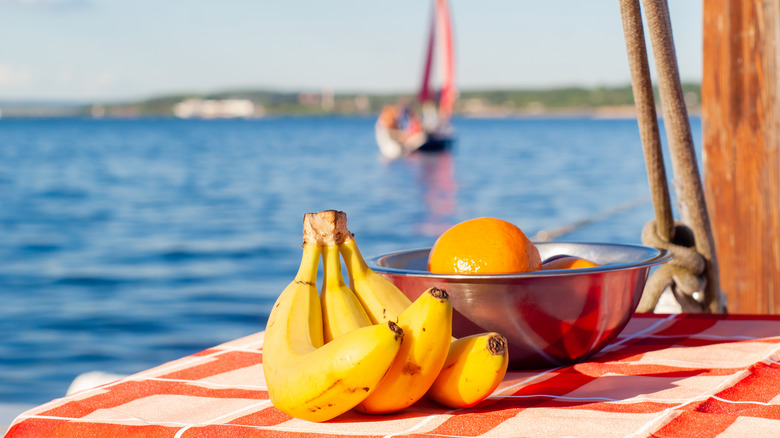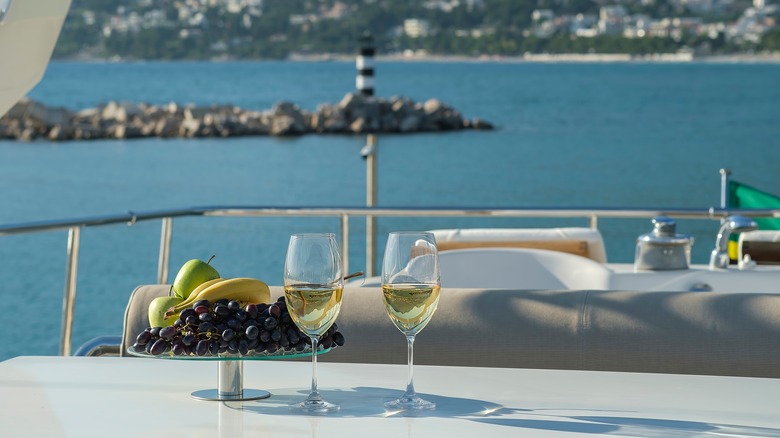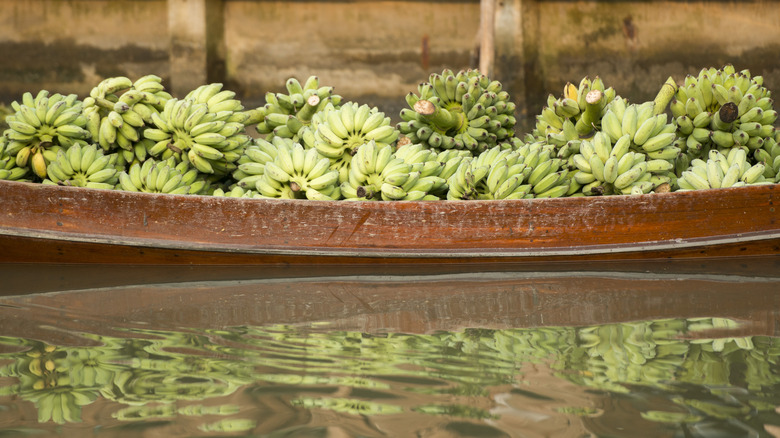The Superstitious Origins Behind Why Bananas Are Considered Bad Luck On Boats
Take a banana on a boat, and you'll likely be branded a landlubber. You see, bringing a banana aboard is considered by many boaters — particularly fishermen — as bad luck. There are several theories about the origins of this superstition, which is one among many myths propagated by mariners worldwide.
One theory dating back to the 18th century purports that when trade ships would sink while sailing from the Caribbean laden with this yellow fruit, bananas were found amongst the floating detritus (the heavier cargo having sunk to the sea bottom, while bananas float). Thus omen-fearing seafarers concocted a correlation between the lost vessels and the presence of bananas aboard.
Bananas are also blamed for unsuccessful fishing days. The origin for this belief may be rooted in the fact that bananas ripen quickly. Those ships heading out from tropical climes needed to sail fast to get to their destinations before the fruit spoiled. It is said that the speed of these banana-carrying ships made it impossible for trolling fishermen to haul in a catch.
More banana boating myths and possible origins
Due to the science behind why some fruits ripen after picking and some don't, bananas possess special ripening powers. This is because of a gaseous hormone, ethylene, that ripening bananas emit. For this reason, a banana can be one fruity ingredient that helps to ripen avocados quickly — simply place a banana in a bag with an unripe avocado, and you can make guacamole in a day or two. That ethylene will also ripen other nearby fruits and vegetables ... but mariners of yore were not aware of this science, and blamed a boatful of rotten fruit on the presence of bananas. While they may have been correct about the cause, they could only attribute it to bad luck instead of biological chemistry.
Two other theories about ill-fated ships that carried bananas relate to genuinely deadly consequences for crew members. Rotting bananas emit methane and hydrogen, and if these gases built up in a hold, the vessel could explode or burst into flames. Sailors also reasonably believed that crates of bananas could host venomous spiders, snakes, and other dangerous critters.
The legacy of these superstitions is that many modern-day skippers prohibit any form of this tropical fruit aboard their vessels. Some are so loathe to allow bananas on their boats they ban anything even referring to the fruit, like Banana Boat sunscreen or Banana Republic apparel.
Other boating superstitions, and banana-blaming busted
Other seafaring superstitions unrelated to bananas include banning suitcases aboard boats, particularly black ones — believed to be an omen of death. Women, redheaded folk, and priests have also been shunned from ships. Throwing stones overboard is considered disrespectful of the sea and will be met with angry oceans — and doing so when leaving harbor will doom the vessel to never return. Looking back to port as one sets sail demonstrates a lack of preparedness for braving the sea's challenges, plaguing the ship with bad luck.
Despite all this, cadets on the Massachusetts Maritime Academy ship TS Kennedy defy the supposed prophesies of bananas aboard. During their 2023 term, they ate more than 400 pounds of bananas, superstitions notwithstanding. Citing bananas' essential nutrients and benefits for digestion and heart health, they make great snacks during a long trip at sea, according to the school.
If you also have no fear of nautical superstitions, there are many delicious things you can make with bananas to easily enjoy aboard a boat, like cookies or muffins. If your ship is setting sail soon and you only have a bunch of green bananas, fret not; this hack will ripen bananas in minutes. So go ahead, make that vegan banana bread you've been craving — and don't be afraid to bring it aboard, if that's okay with the captain.


